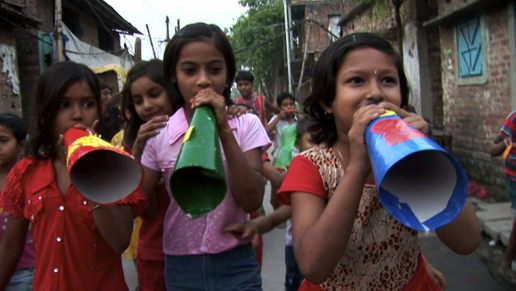By Christoph Hackenberg, UNICEF NZ
UNICEF NZ is proud to sponsor The Revolutionary Optimists at the 2014 Documentary Edge Festival. After successful screenings in Auckland the festival moves to Wellington later this week.
The film follows a youth worker and four of the children he works with on an inspiring journey through adolescence, as they challenge the idea that marginalisation is written into their destiny. Radio Live presenter Graeme Hill recently interviewed Nicole Newnham, co-director of the film. What follows are excerpts from the interview, aired on May 17. Listen to the full interview.

Nicole Newnham: We wanted to make a film about people who were refusing to accept. Such as people who live in extreme poverty around the world who refuse to accept that they have to deal with bad public health and medical situations. We knew there were heroic stories about people who just started doing something to make it better instead of waiting for programmes to come to their neighbourhood.
We read about this guy who was mobilising kids with paper megaphones to tackle problems like giant trash dumps in a neighbourhood or the fact that people weren’t going to get their kids vaccinated against polio. Just by organising and educating children they had doubled the polio vaccination rates and transformed trash dumps into soccer fields. It sounded really fantastical and really incredible.
I called him up, but he was tired of media trying to exploit poor children and hung up on me. He was really busy with everything the children needed and asked that I call him back at 2 o’clock in the morning his time, because that was the only time he had time for me. So I did and we talked for 3 hours. We got some funding to visit and we ended up following the kids for 3 and a half years and watched the community transform in front of our eyes.
GH: Amlan seems to have very strong values and is almost fearless in standing by them. Can you tell us some more about that?
NN: He is really fearless and he is even by Western standards not bound by traditional gender stereotypes, which is quite extreme for India. But he ends up winning people’s hearts and minds because he is so dedicated to the communities and works so arduously to empower the kids to try and make things better.
And people start to see pay-offs and eventually don’t force their daughters into marriage and allow them to go to school, so they are actually bringing in more money, are happier and things are better.
That was one thing that was compelling to us; that the change he is trying to make, could take generations to be realised. When a young woman in the film gets married he just says: “If not her, then her daughter will come and she will be the one to tell her daughter that she can have a better life.” And I think a lot of times in development work people are looking for a quick fix to prove they have made an impact with a programme, but he does not approach it that way.
GH: One extraordinary method is that the kids end up doing it and changing their lives for themselves.
NN: That’s the kind of genius about it. It is very hard for adults who are in charge when kids are shaming them by holding them accountable for doing a bad job. He gets the kids to do a campaign about trash dump to be cleaned up. And eventually he has a big event and when the local news station come and when the politicians see all those children doing this play and having done all this work it is very hard for them to say no.
If you want to find out more about Amlan and this inspiring documentary, The Revolutionary Optimists screens in Wellington June 6-12. Don’t miss it!
For more information visit www.unicef.org.nz/RevolutionaryOptimists.
Interested in seeing the film? Check out the trailer: